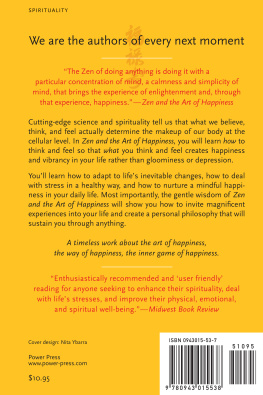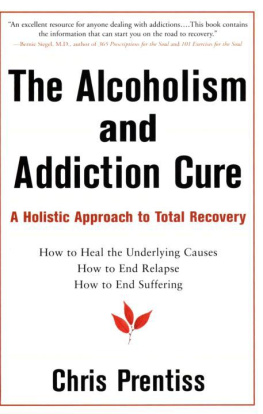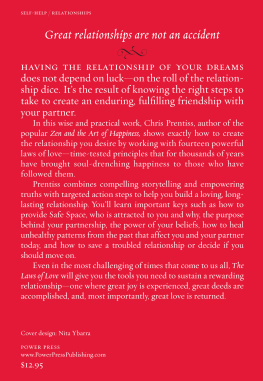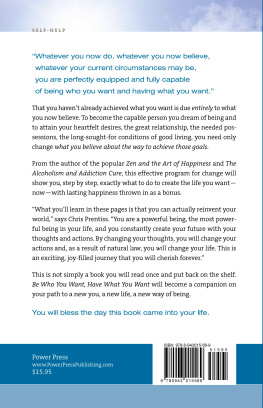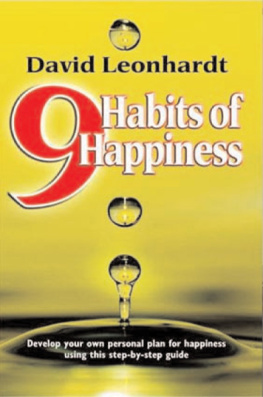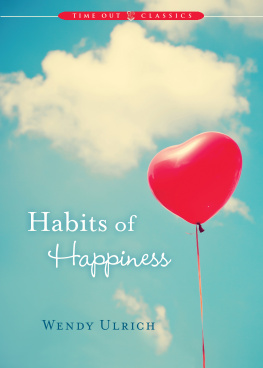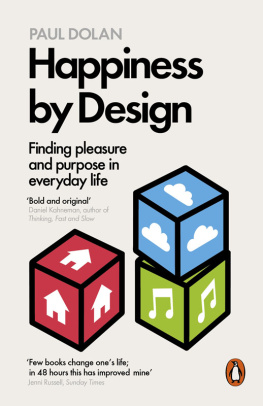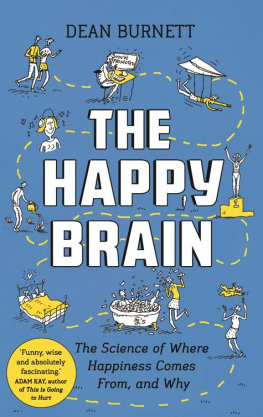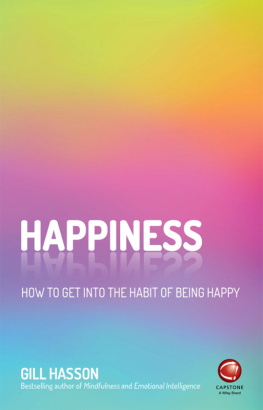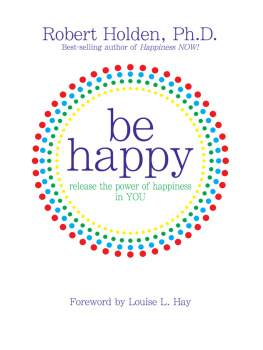critical acclaim
A charming book.Shows readers, with humor and zest, how to live in the now and change our futures. For most collections.
Library Journal
Zen and the Art of Happiness is enthusiastically recommended and user friendly reading for anyone seeking to enhance their spirituality, deal with lifes stresses, and improve their physical, emotional, and spiritual well-being.
Midwest Book Review
The big-bellied, somewhat eccentric laughing Buddha on the cover tells it all. The author does not believe that happiness depends on being the same size as models in the fashion magazines, finding the perfect mate, filling ones house with cutting-edge electronic gadgets, or studying meditation with the current it guru.
The book reflects a long-standing esoteric maxim: We create our own reality. What makes this work different from so many others is the personal energy, knowledge, and insight with which he communicates. He draws on Eastern and Western philosophy, modern science, and personalsometimes catastrophicexperience to explain why believing circumstances will benefit us is what will, ultimately, cause this to be true.
His life has been filled with challenges he has turned into opportunities. He does not lecture to us from a pedestal as an enlightened being. Instead, he speaks as one who has survived the muck and mire and retained his childlike wonder and enthusiasm. Prentiss beckons us to see the world through his eyes and share his joy. It is easy to believe it is possible.
New Age Retailer
Happiness can be a fickle thing. It can be a snug, magnetic garment, attracting more and more of the same, or it can be an ill-fitting gossamer veil flitting here and there. It all depends on ones psychology, karma, and attitude. This wonderful little book shows that we can overcome the obstacles to happiness. Its for those who want and need changein expectations, habits, and outlook. Chris Prentiss teaches us how, with a joie de vivre that obviously comes from experience. Use his practical wisdom to get in the habit of being happyevery day. Put this book by your bedside and the Zen of happiness can be yours.
ReverseSpins.com


Library of Congress Control Number: 2006903540
Copyright 2006 The Prentiss Trust of June 30, 1998.
All rights reserved. Printed in the United States of America. No part of this book may be used or reproduced in any manner whatsoever without written permission except in the case of brief quotations embodied in critical articles or reviews.
For information, address:
Power Press
6428 Meadows Court
Malibu, California 90265
Telephone: 310-392-9393
Email:
Website: www.PowerPressPublishing.com
ISBN: 978-0-943015-53-8 (paperback)
ISBN: 978-0-943015-57-6 (hardcover)
ISBN: 978-0-943015-62-0 (e-book)
10 9 8 7 6 5 4
Cover design: Nita Ybarra
Interior design: Roger Gefvert
For Todd
happiness
The three Chinese characters pictured on the cover and throughout the interior of this book are often used together. Collectively, they denote happiness. Individually, these characters mean:
 | GOOD LUCK |
 | PROSPERITY |
 | LONGEVITY |
The jolly Laughing Buddha on the front cover is a depiction of the endearing and compassionate Buddha known in Japan as Hotei and in China as Pu-tai. Some say the jovial figure is based on an eccentric, wandering Zen beggar monk who lived over a thousand years ago and who is believed to be an incarnation of the bodhisattva Maitreya (the Future Buddha), called the Loving One or Friendly One.
The Buddhas large pot belly symbolizes happiness, good luck, and abundance and he graces all with his joy and playful spontaneity.
contents
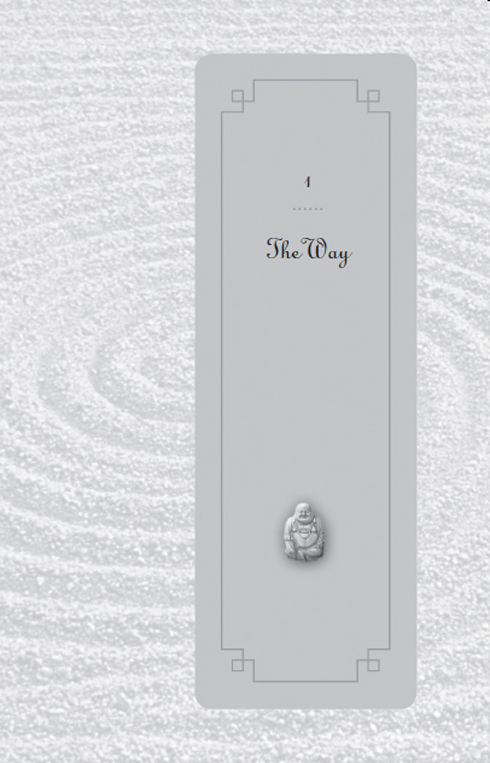
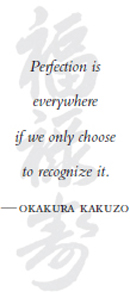
| the way
THERE IS ONLY ONE WAY TO ACHIEVE LASTING happiness. That way is simply: Be happy.
After reading that, you might be having some or all of the following thoughts: Its stupid, and Im beginning to feel very unhappy about buying this book. I hope it gets better. Its too simple. The author has lost his mind and has taken to mumbling inanities. It doesnt tell me enough about how I get to be happy. Things just dont work like that. It doesnt take into account the times when Im decidedly unhappy because of the inevitable mishaps and problems that arise in my everyday life, not to mention the tragedies. You cant just be happy. The author must be getting old.
All of that may be true. Being happy much more of the time than you have been is an incredibly complex and difficult tasknot in the doing of it once you know how but in coming to know how and then in keeping aware of what you have discovered. Yet, I still say you can do it, and by the time you finish this little book, if you are willing to give what you have read a chance to be true, you will do it.
The path that has led to your current condition and situation was not a few days or months in the making, but a long and arduous path that has spanned many years. Actually, it has taken you as long as youve been alive to become the way you are. It has also taken you that long to achieve what youve achieved, to possess what you now possess, and to arrive at your current condition. Your life today is the result of a series of decisions you made that have caused you to arrive where you are.
If who you are and what you have is what you want, if youre satisfied with the conditions of your life, congratulationsdo more of what youve been doing and youll get more of what you already have. But if who you are, what you want, what you have, and your current conditions are less than what you want or are different from what you want, you have to make some changesbasic changes, inner changes. Failure to make those changes will find you fruitlessly continuing to seek the things you desire as the years pass by.
In this book, you may see statements that are contrary to what you believe, contrary to what your experience has taught you, contrary to what others have told you, contrary to the spiritual traditions you grew up with, and even contrary to your own common sense. That is to be expected. If it were not that way, you would have already achieved the art of happiness.
Because some of what you will read may seem impossible or foolish, even ridiculous, it may at first offend your sensibilities, causing you to scoff at it, ridicule it, and reject it. Each time you come upon a statement that has that effect upon you, I suggest that before rejecting it, you ask yourself whether or not you would want that statement to be trueand then give yourself the chance to see it as true.
simple questions
The truth is always near at hand, within your reach.
D. T. SUZUKI
With your permission, I would now like to take you beyond the limits of your customary thoughts and experiences. This new way of life begins with two simple questions.
Next page
